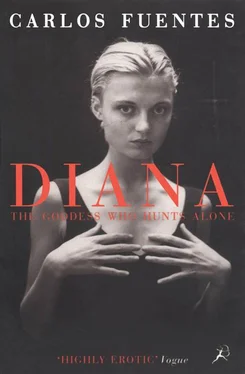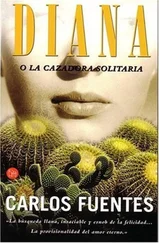Carlos Fuentes - Diana the Goddess Who Hunts Alone
Здесь есть возможность читать онлайн «Carlos Fuentes - Diana the Goddess Who Hunts Alone» весь текст электронной книги совершенно бесплатно (целиком полную версию без сокращений). В некоторых случаях можно слушать аудио, скачать через торрент в формате fb2 и присутствует краткое содержание. Год выпуска: 2012, Издательство: Bloomsbury UK, Жанр: Современная проза, на английском языке. Описание произведения, (предисловие) а так же отзывы посетителей доступны на портале библиотеки ЛибКат.
- Название:Diana the Goddess Who Hunts Alone
- Автор:
- Издательство:Bloomsbury UK
- Жанр:
- Год:2012
- ISBN:нет данных
- Рейтинг книги:3 / 5. Голосов: 1
-
Избранное:Добавить в избранное
- Отзывы:
-
Ваша оценка:
- 60
- 1
- 2
- 3
- 4
- 5
Diana the Goddess Who Hunts Alone: краткое содержание, описание и аннотация
Предлагаем к чтению аннотацию, описание, краткое содержание или предисловие (зависит от того, что написал сам автор книги «Diana the Goddess Who Hunts Alone»). Если вы не нашли необходимую информацию о книге — напишите в комментариях, мы постараемся отыскать её.
Diana the Goddess Who Hunts Alone — читать онлайн бесплатно полную книгу (весь текст) целиком
Ниже представлен текст книги, разбитый по страницам. Система сохранения места последней прочитанной страницы, позволяет с удобством читать онлайн бесплатно книгу «Diana the Goddess Who Hunts Alone», без необходимости каждый раз заново искать на чём Вы остановились. Поставьте закладку, и сможете в любой момент перейти на страницу, на которой закончили чтение.
Интервал:
Закладка:
In winter, the sea howls around the island but not as loudly as my guests at the Opera. I was imprudent enough to invite, willy-nilly, all my current girlfriends, making each one think she was my favorite. I loved to create situations like that: dissimulated passion, rage on the verge of augmenting passion, jealousy about to overflow like a wound to stain our blouses, our shirts, as if we were bleeding from our nipples — all this enabled me to see clearly the fragility of sex and to celebrate instead the vigor of literature.
So I invited not only my lovers to the party at the Opera but new writers like José Agustín, Parménides García Saldaña, and Gustavo Sáinz, who were fifteen years younger than I and who deserved the laurels already wilted on much older heads — mine, for instance. Totally free, uninhibited, funny, mortal enemies of solemnity, these members of the Onda movement wrote to a rock beat and were the natural stars of a party that also wanted to say to the authoritarian, murderous government of October 2, 1968: You last six years. We’ll last a whole lifetime. Your saturnalia is bloody and oppressive. Ours is sensual and liberating.
Such justifications did not absolve me of the frivolity— to say nothing of the cruelty — of my erotic games. At the time I believed, despite everything, that literature, my gospel, excused everything. Others surrendered in the name of literature to drugs, alcohol, politics, even to polemics as a literary sport. I — and I wasn’t alone — succumbed to love, but I retained my right to keep my distance, to manipulate, to be cruel. I was only too happy to wear the costume of Beltenebros, the Lucifer who inhabits the shining moral armor of the chivalric hero Amadis of Gaul. No sooner does Amadis lose his heroism and yield to passion than he becomes his enemy brother, Le Beau Ténébreux: Don Juan.
The Don Juan temptation is erotic but it’s also literary. Don Juan endures because nothing can satisfy him (or, as the best contemporary incarnation of Don Juan grafted onto Lucifer would sing it, I can’t get no satisfaction). It’s a fact that the insatiability of the rake from Seville opens the doors of perpetual metamorphosis to him. Always desirous, always avid, he never ends, never dies: He continually transforms. He’s born young, and after just a few love affairs (two or three in Tirso de Molina), he becomes old in an instant, sated but unsatisfied, an evil and cruel gentleman (in Molière). Tirso’s perverse and juvenile cherub becomes the actor Louis Jouvet’s mortal mask, a rationalist Gallic gargoyle who no longer believes that adolescence will last forever (he repeats, whenever reminded of death, “Let’s hope it’s a long way off”) but who wears his own death mask. Byron, to avoid competition, tames Don Juan and sits him down to have tea with his family during one of those English winters “ending in July, to recommence in August.” But he gives a perverse, quasi-Argentine twist to this domestic metamorphosis. Don Juan discovers he’s in love not with love but with himself, like Argentines who are bored in elevators without mirrors. Don Juan’s love for Don Juan is a despotic trap — nothing less than that of love itself.
To be all that — what a dream, what an elixir — Gautier’s Don Juan, Adam expelled from paradise but remembering Eve, the imprisoned memory that ties him to the perpetual quest for the lost lover and mother; Musset’s Don Juan, sunk in a world of dives and whorehouses where he hopes to find the “unknown woman.” He deludes himself; he’s only looking for Don Juan, and even if all women look like him, none of them is him. But perhaps the real Don Juan, the most public because the most secretive, is Lenau’s, who admits he wants to possess all women simultaneously. That is Don Juan’s ultimate triumph, his most certain pleasure. To have all of them at the same time.
“Tonight I’m going to have them all. All of them.”
Don Juan’s pleasure depends more on disguise and movement than on ubiquity. He’s like a shark: he’s got to keep moving all the time so he won’t sink to the bottom of the sea and drown. He moves, he moves around masked, his mask covering his larval, mutating, metamorphosing condition. He moves and changes so rapidly that his own images can’t catch up with him. Neither Achilles nor the Tortoise, Don Juan is the parable of the disguised man whose disguises are always running after him. He’s naked. He takes his pleasure naked. But to move, he has to dress up, disguise himself and leave behind his most recent disguise, already known, already penetrated, before he puts on the next. In his momentary helplessness, in his Duchampian nakedness scaling balconies and descending ladders, Don Juan is Don Juan only so he can leave his own image behind. He runs, uncatchable by any image that might want to capture him, experiencing the velocity of pleasure in the velocity of change, conquering all frontiers. Don Juan is the founder of the European Common Market: he has lovers in Italy, Germany, France, and Turkey, and in Spain — Mozart tells us — a thousand and three. The Machiavelli of sex, a figure disguised in order to escape the vengeance of fathers and husbands but, above all, to escape tedium … That is how I, secretly, ridiculously, painfully, wanted to be …
Minimal forty-year-old Don Juan of the Mexican night, I aspired as a man to that power of metamorphosis and movement. But most of all, I wanted it as a writer. Loving or writing, nothing is more exciting or more beautiful than recognizing the struggle between the power we exercise over another person and the power the other — man or woman— exercises over us. Everything else vanishes in that ungraspable tempest of mutual attraction, of resistance that, out of lust for power or a mere instinct of survival or perhaps perversity, we put up to the attraction of another. The charm of such a struggle, obviously, is to yield to it. How? With whom? When? For how long? This is the common ground shared by sex and literature. An ashen-winged angel flies over. That dark angel, that tarnished Eros, is Don Juan, Cupid in flames, his own androgynous putto, who deposits on the eyelids, in the nostrils, the ears, the mouth, the anus of the loved one, on the back of the head, if necessary, the seeds of a smile, of a voice, of a glance. Of a desire. Beltenebros the melancholy whispers softly in my ear and tells me, “There can be nothing sadder than the taste of the women you will never possess, the men you lost out of fear, out of conventionality, out of dread of taking the forbidden step, out of lack of imagination, out of inability to become, as Don Juan does, someone else.”
I want to be very frank in this story and keep nothing to myself. I can wound myself whenever I like. But I don’t have the right to wound anyone who isn’t me, unless, of course, I amorously sink into myself the dagger I end up sharing with someone else. Right here at the outset, I list the terrors that assail me. I try to justify sex with literature and literature with sex. But the writer — lover or author — ultimately disappears. If he shouts, he disintegrates. If he sighs, he’s done for. You’ve got to be conscious of this before affirming, above all things, that life is never generous twice.
That night at the Opera Bar, in a Viscontian, which is to say operatic, setting, I felt I’d sunk the dagger too frequently, wounding myself more than I’d wounded the women whom I’d tried to manipulate but who, I knew only too well, could repay me in the same coin. I chose one, I earned the hatred of the rest, and Styron, Terrazas, and I left the next day for Guadalajara and the Pacific coast, where the Hotel Camino Real in Puerta Vallarta, designed by my friend, was celebrating its grand opening.
It was there I received the foreseeable lesson. One afternoon, the girl I was traveling with casually left a letter on the bed in our hotel room. She was writing to another of her boyfriends, arranging a date for New Year’s Eve, which, of course, she refused to spend with me. “Writers only for a little while, because they give me brain food so I can make better love with you, darling. Besides, the oldtimers have their own kind of kicks … like drinking champagne all day. It just gives me heartburn. Put some sodas on ice for me, baby. Remember, if there’s no Coke, I just don’t celebrate …”
Читать дальшеИнтервал:
Закладка:
Похожие книги на «Diana the Goddess Who Hunts Alone»
Представляем Вашему вниманию похожие книги на «Diana the Goddess Who Hunts Alone» списком для выбора. Мы отобрали схожую по названию и смыслу литературу в надежде предоставить читателям больше вариантов отыскать новые, интересные, ещё непрочитанные произведения.
Обсуждение, отзывы о книге «Diana the Goddess Who Hunts Alone» и просто собственные мнения читателей. Оставьте ваши комментарии, напишите, что Вы думаете о произведении, его смысле или главных героях. Укажите что конкретно понравилось, а что нет, и почему Вы так считаете.












